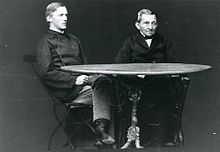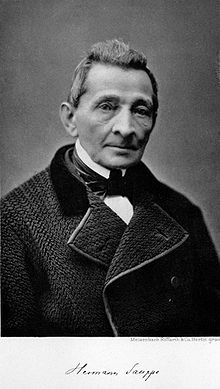Hermann Sauppe
Hermann Sauppe (born December 9, 1809 in Weesenstein near Dresden , † September 15, 1893 in Göttingen ) was a German classical philologist , educator and epigraphist . He made particular merits as a professor at the University of Göttingen for the academic teaching there (from 1855). His critical editions of the Attic speakers ( Oratores Attici , with Johann Georg Baiter ) and the Platonic dialogues Protagoras and Gorgias are important .
Life
Hermann Sauppe was born as the son of pastor Friedrich Gottlob Sauppe (1781–1820) and his wife Clementine, née. Croll (1786–1855) born in the village of Wesenstein near Dresden ; he had two younger sisters, Bertha (1812-1851) and Laura (1818-?). His childhood was influenced by the Wars of Liberation , especially the trains of the Russian Army. After his father moved to Burkhardswalde , Sauppe experienced quieter years, in which he also received his first lessons from his father. After his death on June 9, 1820, the widow and the youngest daughter moved in with her mother, while Hermann Sauppe was taken in by his paternal uncle: Christian August Sauppe (1792–1839), cantor and first teacher at St. Othmarskirche since 1814 was in Naumburg . From 1820 to 1827 Sauppe attended the Domgymnasium Naumburg , since 1825 as a senior prime minister. He found the ancient languages particularly through the suggestion of Rector Gregor Gottlieb Wernsdorf (1776–1834).
Sauppe initially financed his subsequent studies at the University of Leipzig through tutoring and proofreading for several publishing bookstores. He soon joined Gottfried Hermann's philological seminar , to which Eduard Putsche (1805–1882) and Moriz Haupt also belonged, and became a top student of the famous text critic. He was also a member of the Leipzig fraternity Germania and frequented the house of the publisher Salomon Hirzel . Sauppe later moved to Halle an der Saale , where he passed the state examination and received his doctorate under Gottfried Hermann in 1832. According to the custom of the time, his dissertation was not printed.
High school teacher and private lecturer in Zurich
At Easter 1833, Sauppe started his first job as a Latin teacher at the newly founded high school in Zurich and at the same time as a private lecturer at the university there . Thanks to his zeal for work, the establishment of the Zurich Cantonal Library with 25,000 volumes (1835), a predecessor of today's Zurich Central Library ; In 1837 he became senior librarian. In 1838 Sauppe was elected vice rector of the grammar school and appointed associate professor. At the urgent request of the Zurich Education Council, he turned down an appointment as director of the grammar school in Schaffhausen . In 1838 he also married 18-year-old Emilie Nüscheler, daughter of the Zurich town clerk, in whose apartment the young couple moved. At this time Sauppe acquired Swiss citizenship and chose Schottikon as his home parish. In Zurich he was in lively personal and political exchange with personalities such as Adolf Ludwig Follen , Jakob Henle , Georg Herwegh and Gottfried Keller . In spite of this, Sauppe felt like a stranger in Zurich and, after an extensive trip through Germany in 1844, made his return. He therefore refused an appointment as a full professor at the University of Bern .
High school director in Weimar
In October 1845 Sauppe received a position as director at the Wilhelm-Ernst-Gymnasium in Weimar . His reputation as a pedagogue became known here beyond the boundaries of his sphere of activity; An important innovation of these years was the teaching of classical German literature, the language of which was no longer Latin but German. Sauppe fought for a more extensive recognition of the teaching status, which manifested itself in the permission to appear at court. In the city he belonged to a cultural group around Ludwig Preller , Gustav Adolf Schöll and Wilhelm Theophor Dittenberger , frequented neighbors Hans Christian Andersen and August Heinrich Hoffmann von Fallersleben and was also a frequent guest of Franz Liszt and his partner and hostess at Altenburg Carolyne zu Sayn-Wittgenstein . In Weimar he enjoyed the favor of Grand Duchess Maria Pavlovna , who bought him a bathing trip to Ostend in 1853 to recover . He was chairman of the commission for the erection of the Goethe and Schiller memorial and led the correspondence with the artist Ernst Rietschel . In 1854 he turned down a call to the Katharineum in Lübeck (as director).
Professor in Göttingen

Only when he was appointed to the longed-for chair in Göttingen as the successor to the eye-suffering Friedrich Wilhelm Schneidewin in 1855 did Sauppe leave Weimar. According to his own earlier testimony, with this post Sauppe finally had the opportunity to devote himself to scientific work without restriction. His preoccupation with text criticism and especially with Greek epigraphy reached its climax here. He also carried his fundamental research achievements into the lectures: in 1860 he was one of the first professors to read about "Greek and Roman epigraphy". In contrast to his teacher Gottfried Hermann, he turned to subject philology and paid attention to the linguistic and critical training of the students. He had over 100 listeners in his lectures, seminars and exercises.
Sauppes most important merit in Göttingen was the establishment of the educational seminar. Through his decades of teaching experience at secondary schools, he was called to train the philology students specifically for their future teaching profession, especially since the education authority was the goal of most students of this subject at that time. The seminar only accepted six members at a time and trained over 250 students in Sauppe's time. In addition to his work as head of the seminar, Sauppe was prorector and three times deputy of the University of Göttingen in 1859/60, 1860/61 and 1873: when the University of Strasbourg was founded in 1871, at the golden wedding of Emperor Wilhelm I in 1879 and at the Zurich university jubilee in 1883. He made trips abroad in 1868 to Florence and Rome and in 1875 to Greece accompanied by Otto Lüders and his students Carl Robert and Rudolf Schöll .
Sauppe was editor of the Göttingen Scholars Ads and since 1861 a corresponding member of the Göttingen Society of Sciences . After the death of Friedrich Wöhler in 1883 he took over the management of the company as secretary. In 1865 he turned down an offer from Bonn University , which his friend Otto Jahn tried to get. In this way, Jahn's colleague Friedrich Ritschl found out about the appeal request that had happened behind his back, which led to the Bonn philologists' dispute, in the course of which Ritschl transferred to the University of Leipzig .
Sauppe remained active in research and teaching well into old age. He was one of the oldest colleagues of Ulrich von Wilamowitz-Moellendorff , who had been a professor in Göttingen since 1883. Sauppe died a few weeks after the death of his wife on September 15, 1893. Wilamowitz gave a commemorative address to the Göttingen Society of Sciences; the funeral address of the theologian Hermann Schultz was published in the same year by the Göttingen publishing house Kästner. Sauppe's extensive estate is in the Lower Saxony State and University Library in Göttingen (signature: Cod. Ms. H. Sauppe). His library, which comprised around 9,000 volumes and 7,000 reprints, was acquired by Bryn Mawr College in the United States, where Sauppe's student Herbert Weir Smyth worked.
The Sauppe couple had four children: Heinrich (* 1841), Hedwig (1842–1926), Bertha (* 1844, married to the geologist and paleontologist Karl von Seebach ) and Gertrud (1860–1946, married to the mathematician Hans von Mangoldt ) .
Sauppe was secretly called Saufrat Hoppe among his Göttingen students .
Services
Sauppe made lasting merits in three fields: in education, in textual criticism and in epigraphy. Basically, through the emancipation of the German language as a lingua franca in academic teaching, as well as through his turn to subject philology, he decisively helped classical philology to its heyday in the second half of the 19th century.
The fruit of his lifelong preoccupation with the Attic speakers, which he began in Zurich, were the Oratores Attici edited by Sauppe and his colleague Johann Georg Baiter , an edition that is still important today. It appeared in two series 1839–43 and 1845–50 and was last reprinted in 1967 (Olms, Zurich).
Sauppe promoted the process of establishing the German language in the classroom in particular through his edition of Latin and Greek authors with German annotations, which were written in the early Weimar years at Dietrich Reimer's suggestion . The company was looked after by Moriz Haupt, who, as a university professor of the school system, was further away than Sauppe. It was he who influenced the publication according to pedagogical standards. The scope of this enterprise already shows the choice of auxiliary books: Ernst Curtius ' Greek History , Theodor Mommsen's Roman History , Theodor Bergk's Greek History of Literature ; A handbook on archeology by Sauppe's fellow student in Leipzig, Otto Jahn, and a Roman literary history by Ernst von Leutsch were also planned . Von Sauppes Hand published the series of editions of Protagoras (1857) and of Gorgias (edited from the unfinished manuscript by Alfred Gercke , 1897), the conjectures of which are still important today for the design of the text.
literature
- Conrad Trieber : (Ed.): Selected writings: With the image of Hermann Sauppes. Berlin 1896 (with list of publications pp. 929–944).
- Erich Ziebarth : Sauppe, Hermann . In: Allgemeine Deutsche Biographie (ADB). Volume 55, Duncker & Humblot, Leipzig 1910, pp. 146-158.
Web links
- Literature by and about Hermann Sauppe in the catalog of the German National Library
- Hermann Sauppe in the Internet Archive
- Literature by and about Hermann Sauppe in the catalog of the SUB Göttingen
- Hermann Sauppe's family tree
- Overview of Hermann Sauppe's courses at the University of Zurich (summer semester 1833 to summer semester 1845)
- Digitized books from Hermann Sauppes library
Individual evidence
- ↑ Journal für Prediger , Volume 62/1 (1821), p. 55.
- ↑ Gustav Emil Lothholz: pedagogy of modern times in life images , Gütersloh 1897, S. 437f.
- ^ Günther Meinhardt: Bullerjahn. Old Göttingen student anecdotes , Göttingen / Zurich 1974, p. 168.
| personal data | |
|---|---|
| SURNAME | Sauppe, Hermann |
| BRIEF DESCRIPTION | German classical philologist, educator and epigraphist |
| DATE OF BIRTH | December 9, 1809 |
| PLACE OF BIRTH | Weesenstein near Dresden |
| DATE OF DEATH | September 15, 1893 |
| Place of death | Goettingen |

